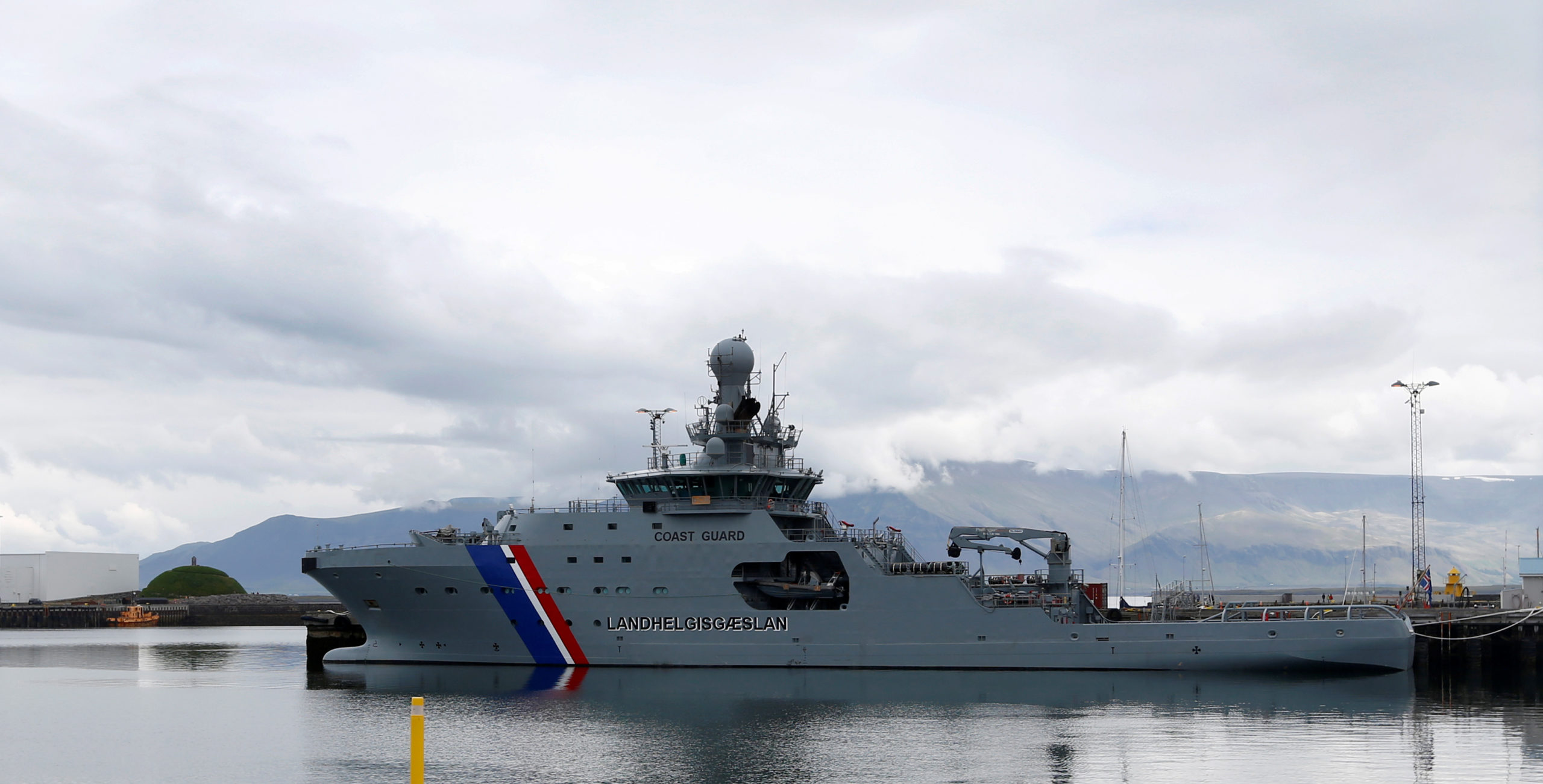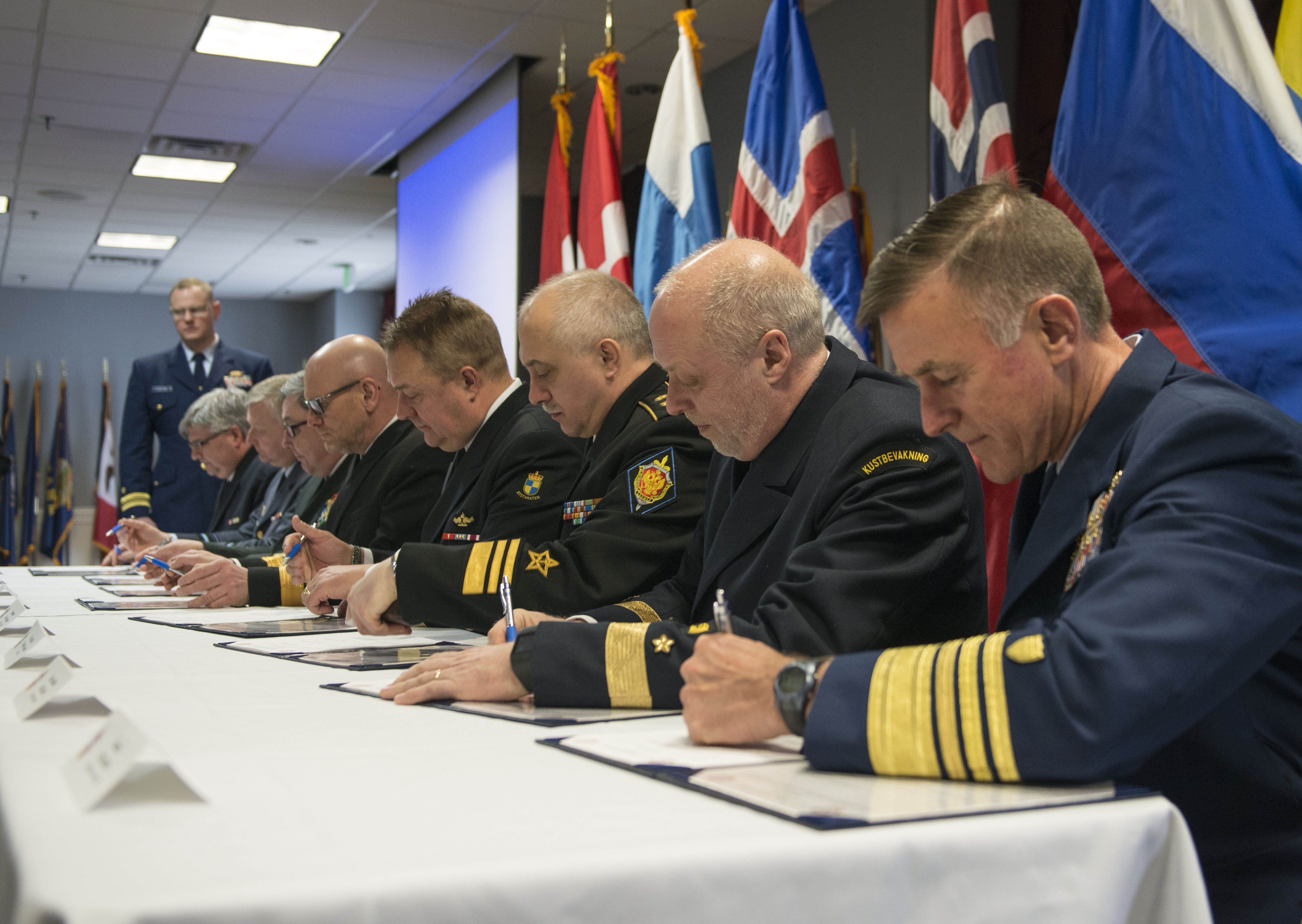Arctic disaster responders train together in a first-of-its-kind joint exercise
Arctic Guardian 2021 marked the first time the Arctic Coast Guard Forum drilled together with the Arctic Council's Emergency Prevention, Preparedness and Response working group.

An oil tanker and a cruise ship with 250 passengers aboard, both navigating along the northern coast of Iceland, collide.
The ships take on water, endangering passengers and crew while oil spills into the ocean. It’s springtime, and floating sea ice makes the waters more difficult to navigate.
That was the scenario in an exercise earlier this week, when Arctic emergency responders drilled in search-and-rescue and oil spill response in the Arctic.
The three-day exercise, called Arctic Guardian 2021, followed a tabletop exercise on the same scenario in October and was originally slated to be held live in Icelandic waters, but was instead conducted online because of pandemic concerns.
It marks the first time the Arctic Council’s Emergency Prevention, Preparedness and Response working group and the Arctic Coast Guard Forum collaborated on their response to a potential crisis.
As shipping, tourism and resource extraction increase in the Arctic, so does the risk of maritime incidents such as the one in the exercise, even as the factors such as difficult access, harsh weather, and limited infrastructure will continue to complicate responses such as those the exercise simulated.
The exercise “helped us better understand how all of us could cooperate and assist if a major maritime incident occurred in our region,” Rear Admiral Georg Lárusson, Chair of the Arctic Coast Guard Forum and Director General of the Icelandic Coast Guard, told ArcticToday in an email.
“As we know, disasters can strike without any previous indication, anytime, anywhere and the Arctic and adjacent regions are incredibly challenging,” he said, and “if that happens, we need to be able to work together across borders.”

Arctic Guardian is a biannual exercise for the Arctic Coast Guard Forum, which was established in 2015. But this was the first time it was conducted jointly with EPPR.
“The goal was to make this exercise, the one that we did this week, as operational as we possibly could,” Commander Wes James, chief of international and domestic preparedness at the U.S. Coast Guard and head of the U.S. delegation to EPPR, told ArcticToday.
He called Arctic Guardian 2021 “a virtual but yet still tactical exercise.”
“Of course, we’re not in person and aboard vessels or aircraft, or moving boom about,” James said. But commanders who would have responded to such an incident were involved closely with the exercise.
Representatives from all eight Arctic nations — Canada, Finland, Iceland, Denmark, Norway, Russia, Sweden and the United States — participated, as well as subject-matter experts from nongovernmental organizations and industry.
The goal of the exercise was to make sure two existing maritime agreements, on oil spill response and search and rescue, are “applicable and useful and have everything that we need as countries to be able to come together,” James said.
“From the moment we get a notification that Iceland has an incident that they are requesting assistance for, how do we start that process?” he asked, pointing out that aircraft and vessels are likely spread out on other missions. “How do we get them ready to go and over to Iceland in short order?”
In a crisis such as the one in the exercise, where ships are taking on water and oil is spilling at the same time, the first priority is saving lives, particularly in the frigid waters of the Arctic, James said.
But, he added, “the oil doesn’t wait around to spill until after the search and rescue.”
It’s important to begin preparing for environmental response operations once the search-and-rescue operations are underway. “Working through that nuance and that transition is something that we looked at during this exercise as well,” James said.
The virtual format of the exercise proved to be a challenge, particularly because discussions didn’t flow as naturally as they might have in person.
Participants instead relied on the chat boxes of virtual meetings to help smooth interactions. James said the virtual chat function “sounds so simple but [was] absolutely critical to the success of this exercise.”
Despite these challenges, the exercise helped representatives from different countries understand their counterparts’ different approaches to crisis management, from tracking rescues and casualties to using different terminology, James said. “It’s really eye opening, seeing how differently each country does it.”
Preparing for situations like these in advance can help all of the many players dive into action when a crisis occurs, particularly as maritime activity in the Arctic increases and new challenges may arise.
“I know who I’m going to talk to when I fly to Iceland to help out with the response,” James said. “Those conversations and discussions have already happened well enough in advance. The terminology is the same. There’s so many things that come into play in advance of actually executing a response like this, so that’s why these exercises are so important.”
This week’s exercise was hosted by Iceland, whose two-year term as chair of the Arctic Council comes to a close next month. Future such collaborative exercises will be up to the next chairs of the Arctic Council. Russia will assume the two-year chairmanship in May.
The Arctic Coast Guard Forum is one of the few organizations where Russia still collaborates with its Arctic neighbors.
“I would say there’s a very strong appetite for us to do it again together, most likely in the live exercise format,” James said. “I can expect to see some interest in moving toward that direction, maybe toward the end of Russian’s chairmanship in 2023.”
In the meantime, organizations like the Arctic Coast Guard Forum and EPPR will continue to prepare with independent exercises.